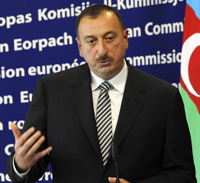Strasbourg prides itself on being the “European capital of human rights.” The historic French city, located on the border with Germany, is home to the Council of Europe (CoE), a 47-member institution focused on the promotion of democracy and the rule of law.
It is also the seat of the European Court of Human Rights (ECHR), whose rulings have consistently defended press freedom against abrasive judgments or abusive practices of CoE member states.
But what is the court’s actual power when a member state refuses to abide by its judgments and keeps violating the most basic norms enshrined in the European Convention on Human Rights? What can the council do to enforce the implementation of its rulings on a recalcitrant member, which has not only bent but broken its international commitments?
A delegation representing the International Partnership Group for Azerbaijan–a coalition of 20 press freedom groups–traveled to Strasbourg last week to raise just those questions. On March 1-3, Rebecca Vincent (Article 19), Natasha Schmidt (Index on Censorship), Rashid Hajili (Media Rights Institute, Baku) and I raised the case of Eynulla Fatullayev, a 2009 recipient of CPJ’s International Press Freedom Award. Fatullayev, a popular newspaper editor and relentless investigative reporter, has been languishing in a Baku prison since April 2007 when he was arraigned on a cascade of trumped-up charges, including libel, terrorism, tax evasion, and incitement to hatred. This mighty cocktail of indictments resulted in a hefty cumulative sentence of eight and a half years in prison for Fatullayev.
His true crime? He dared question the legitimacy of the official probe into the 2005 murder of his boss, respected magazine editor Elmar Huseynov, who was gunned down with impunity six years ago. Fatullayev accused authorities of deliberately obstructing the investigation and ignoring evidence that could lead to the masterminds of Huseynov’s killing. The editor’s troubles are the focus of CPJ’s 2008 special report “Finding Elmar’s Killers.”
Having exhausted all domestic avenues for redress, Fatullayev and his legal team filed an appeal with the ECHR. In two rulings, issued in March and October 2010, the ECHR declared Fatullayev’s imprisonment illegal, ordered his immediate release and the payment of 27,822 Euros (US$37,854) in damages. The court stated that the Azerbaijani government had violated his rights to freedom of expression, a fair trial, and presumption of innocence. But just in the run-up to the March ruling, authorities slapped the editor with yet another charge, drug possession, apparently designed to keep him behind bars despite Strasbourg’s decision. A few months later, in July 2010, Fatullayev was sentenced to an additional two-and-a-half-year term in a strict-regime prison despite high-profile international advocacy, including by CPJ.
As a signatory of the European Convention on Human Rights, Azerbaijan is bound to comply with the rulings of the European Court. Baku authorities, however, have flouted their obligations. In addition to keeping Fatullayev in custody, they have failed to investigate death threats against him and his relatives, and have deliberately prevented his family from accessing his court-ordered compensation.
In our meetings with diplomats from several European states and officials with the European Commission of Human Rights and of the Council of Europe, the delegation pushed for tougher actions that would compel Azerbaijan to honor its international commitments and release Fatullayev.
We received assurance that Fatullayev’s case will be discussed at the March 8-10 human rights meeting in Strasbourg of the Committee of Ministers, the CoE’s decision-making body. The diplomats our delegation met with committed themselves to pressing Baku on its failure to end Fatullayev’s detention.
For journalists, including myself, who are used to swift action and speedy words, the pace of the CoE procedures looks desperately formal and excessively cautious. Inevitably, it makes one wonder why the Council of Europe accepted a country that so defiantly violates fundamental principles of international conduct as a member in the first place.
The respect of procedures is of course a guarantee that the CoE applies to itself the rules it requires of its member states. However, barring the threat of suspension from the organization, the cautious reprimand so far given to Azerbaijan appear harmless and unlikely to impress Baku.
Indeed, as noted in the 2010 edition of CPJ’s press freedom survey, Attacks on the Press, Azerbaijani authorities are convinced that they can withstand international pressure thanks to the growing importance of the country as a gas and oil provider, for which it is being assiduously courted by Russia, Turkey, the European Union, and the United States. But energy and strategic interests, we at CPJ believe, must never trample press freedom and human rights concerns. In fact, those interests must precede all others; for without the necessary conditions for the press to cover sensitive issues, no state can be regarded as a safe, transparent partner in diplomacy, business, and security.
“Speak softly and carry a big stick,” U.S. President Theodore Roosevelt once said. During what are bound to be tense discussions with Azerbaijani officials this week, European diplomats have an ample room to hold the proverbial big stick of public naming and shaming. They must push Baku to respect its press freedom commitments.
(Reporting from Strasbourg)
